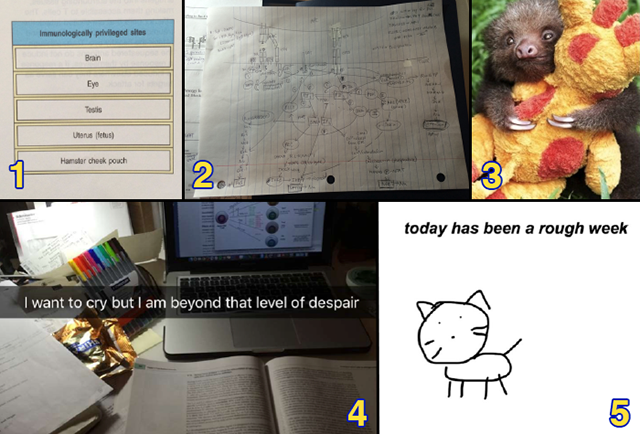As of March 7, 2016, I passed my preliminary exam and will officially be a Ph.D. candidate Fall 2016.
I took notes throughout my experience for the purpose of writing this post, and I’ve included some visuals to break up the text to really convey how this experience went. Part one of this post will focus on describing my prelim experience where part two will focus on my reflections.
All about prelims
Preliminary exams, also known as prelims and sometimes synonymous with qualifying exams or quals, are an experience that is hard to describe, but they’re something graduate students can all relate to as potentially one of the most stressful times in their graduate career. It’s like the hazing experience everyone goes through to become a true graduate student. Prelims are a test graduate students have to take usually within the first two to three years, and the outcome of the test determines whether they can stay in the graduate program. No pressure.

Channeling Chris Traeger since January. (gif1, gif2)
After taking past student feedback into account, our program decided to change the prelim format for my class to make the process more equal among students and more streamlined. We were given two immunology papers to know in depth. We then chose one of the papers to write a two-page specific aim proposal to defend during a 1.5 hour oral defense where we were also tested on general immunology topics. Previously, students were scheduled on different days with different faculty panels depending on the student’s topic. This year, we were all tested on the same day with the same faculty panel. Additionally, in my program, students can receive a “conditional” pass where students get a second chance at parts of or the entire prelim exam. If a student doesn’t pass the second time, they are “dismissed” from the program.
Some program prelims are solely thesis proposal based, meaning students present their thesis project to a faculty panel/committee. Other programs might have a written test to test general knowledge as well as an oral test where they have to present their thesis project. Some programs don’t tell students the results until weeks after the test and other programs tell students immediately. Each program’s “conditional” pass may also mean different things. Pretty much every program’s preliminary exam is different, so I can only describe my own experience in detail. However, I reached out to fellow graduate students for summaries of their experiences which will be in part two of this post!
One thing that really helped keep my head above water throughout this process was my fellow second year students. We met up pretty much every weekend two months before the exam, and while I still ended up doing a lot of last minute panic studying/writing/scrambling, meeting up with other people helped keep me accountable. Being tested on the same two papers made it easier for us to study together since we needed to be familiar with the same set of knowledge, and none of the papers were specific to any of our research. The dates aren’t 100 percent accurate (my prelim note-taking became nonexistent around mid-February), but here’s a fairly comprehensive timeline of my prelim preparations including photos/gifs/snaps that I found in my phone’s photo history that I sent to friends during the months leading up to the exam (marked with an asterisk).
My Studying Timeline
January 4: Received the two immunology papers, list of immunology topics and instructions/due dates
January 11: Expectation: begin reading paper one (we picked the shorter one to ease our way into this process)
Reality: actually finished reading it January 22
January 23: Start meeting with classmates; go over paper one
January 30: Meet with classmates to go over paper two
February 6: Expectation: pick a specific aim topic and discuss with each other
Reality: Brain storming session with each other to figure out a topic, further review paper two because it was really complicated
February 13: Prepare and discuss our specific aims outlines
February 18: Expectation: send each other specific aims for edits
Reality: miscommunication issues
February 19: Managed to send each other very, very rough drafts
February 20: Peer edit/discuss our specific aims
February 22: Specific aim due (emailed to program director)
Week of Feb 22*: Study general immunology in panic mode
Feb 24-25: Practice specific aims presentation to the 3rd to 5th year students in the program, get quizzed on general immunology questions, get feedback
February 27: Study session with other second years, review papers
Week of Feb 29 *: More studying, finish specific aims presentation
March 3: Practice presenting my specific aim presentation to my lab
March 5: Study session/review with other second years, review papers
March 6*: Last minute studying, review papers, practice specific aims presentation to an imaginary audience
March 7*: Day of exam

Collage of images described in text below.
Captions:
1) Week of February 22: Stumbled upon this chart in my immunology textbook (Janeway’s Immunobiology, 8th edition) about special sites in the body where immune cells aren’t allowed… One is not like the others. The brief Wikipedia page for those who are interested: cheek pouch.
2) Week of February 22: The textbook doesn’t do a great job of compiling similar receptor signaling pathways into one comprehensive figure so I decided to make my own.
3) Week of February 29: Took study breaks and browsed Reddit. The sloth clutching a giraffe stuffed animal photo helped get me through studying. http://imgfave-herokuapp-com.global.ssl.fastly.net/image_cache/1335375087275370.jpg.
4) March 6 (day before prelim): Being dramatic on Snapchat while eating Ghirardelli semi-sweet chocolate baking chips.
5) March 7 (day of prelim): In everyday conversation, I exaggerate about how I cry about everything when in reality I haven’t cried in about two years. But after leaving the room and walking down the hallway towards the hospital, I found myself feeling so overwhelmed by the fact that this whole process was finally, finally over and basically broke through this emotional dam and ended up tearing up on and off for the rest of the day. I felt ridiculous at the time but mentally, I felt so much better at the end of the day.
My actual prelim experience is a bit of a blur. It went by a lot faster than I anticipated. I was asked to explain the paper I didn’t write about and then we moved onto my specific aims presentation where the faculty asked me about what I could’ve done differently and other pathways I hadn’t considered. Like most students, I was nervous but based on advice from other students, I brought a thermos of hot tea to drink throughout the presentation and it did help calm me down and gave me time to think about my answers. The exam ended with general immunology questions that weren’t covered by the papers or specific aims and the answers they wanted were a lot more general than I studied for. Near the end of the exam, I got really mentally drained and didn’t want to answer any more questions and couldn’t get out of the room fast enough.
Overall, like many other graduate students told me, I found prelims to be a pretty anti-climactic experience. But I’m so glad they’re over so I can move forward with the rest of my graduate experience. Part two of this blog post will contain more of my reflections along with advice I was given as well as my own advice.
